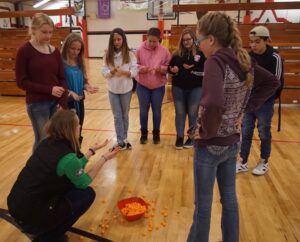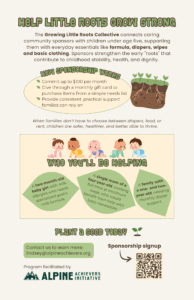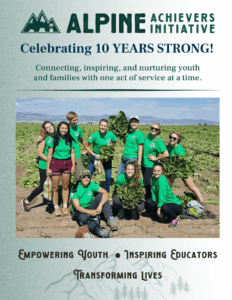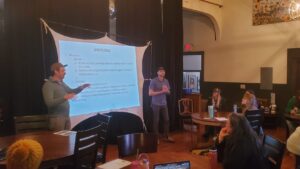 For Earth Day 2019, Alpine Achievers Initiative (AAI) hosted an Earth Day celebration at Mountain Valley School in Saguache, CO. Four AAI staff members offered this half-day program to middle schoolers, featuring different activities. This program was a way for teachers to bring an outside voice into their school that supports the work they are doing in the classroom. Spending the morning learning about the Earth is a wonderful opportunity to highlight the importance of Earth Day in order to grow their appreciation for the Earth every day.
For Earth Day 2019, Alpine Achievers Initiative (AAI) hosted an Earth Day celebration at Mountain Valley School in Saguache, CO. Four AAI staff members offered this half-day program to middle schoolers, featuring different activities. This program was a way for teachers to bring an outside voice into their school that supports the work they are doing in the classroom. Spending the morning learning about the Earth is a wonderful opportunity to highlight the importance of Earth Day in order to grow their appreciation for the Earth every day.
Earth Day Education
Our staff members had stations where they each led activities about things they are passionate about. This ranged from mindfulness in the outdoors, the importance of pollinators, Earth’s ability to sustain life, and Leave No Trace principles.
Ryan, AAI’s Program Director, led a sound map activity at a park outside of the school. This activity encouraged participants to open their awareness to things they don’t normally pay attention to this Earth Day. They each received a pencil, a clipboard, and a paper. To start, they made a mark in the center of the paper—where they sat—and closed their eyes to listen. As they heard sounds, they marked their sound map to indicate where they thought the sounds were in relation to them. Sitting quietly—listening to the soothing voices of nearby trees, birds, and rustling grasses—calms us and deepens our appreciation for the life around us.
AmeriCorps in Action
Darci, our AmeriCorps member that serves with the Greater Arkansas River Nature Association (GARNA), led an activity about pollinators – who they are, what they do, and why they’re important. Earth Day isn’t just about the planet, but about what’s on it! This station was meant to be fun and interactive, as students got to mimic pollinators through a relay race and a scent matching game.
The relay race showed the students how pollinators are typically not after pollen (cheese puff crumbs), but are after the nectar and nutrients of the flower (fruit snacks), and that pollination is an unintended action. In the scent-matching game, blindfolded students acted as bees and matched with other students, acting as flowers, by using scent.Pollination is crucial to growing the nation’s foods, and pollinator species such as Monarch Butterflies and Bumblebees are declining rapidly. Students took away a handful of tips to saving pollinators such as supporting local farmers and beekeepers, and planting native plant species.
Earth Day Throughout the…Universe?!
At Maddie’s station, students were able to understand just how special the Earth is with an activity about habitable planets. First they reviewed the planets in our solar system and learned about the Goldilocks Zone – the spot that is not too close and not too far from the sun – just right – that allows life on Earth to have exactly what we need to thrive. Students then were broken into groups and told they were going on a deep space mission.
They brainstormed what they would need to bring with them on this mission. After packing their shuttle and taking off, a meteor hit them, forcing an emergency landing on a distant planet. They chose from 8 imaginary planets with details about atmosphere, temperature, material, and more to decide where to land based on which would support long-term habitation. This activity helped them understand the unique qualities that make Earth perfect for sustaining life.
B2B
Our Backyard to Backcountry staff member, Matt, educated the students about Leave No Trace Principles. Here, they learned about what they could do to take care of the environment when they are enjoying the outdoors. The groups started out with a team building activity to increase energy before jumping into outdoor ethics. One of the most eye opening activities for the students was learning about decomposition for common objects.
Students were very surprised to learn about how long it took for things like banana peels, plastic, aluminum, and more to decompose in different environments. This was a great way to learn the value of recycling. Next, they created an “environmental web.” Each student was assigned a part of an ecosystem (a bird, a plant, a log, a bee, etc.) String was then passed around to show how each part of an ecosystem is interconnected.
The MVS students finished up their day by going out and picking up trash with their teachers in some of the open space in town. What an action packed day to celebrate this giant rock we call home!
AAI will be hosting another Earth Day program open to middle schoolers in the SLV on Wednesday, April 22nd, 2020! Contact Maddie at coordinator@alpineachievers.org if you are interested in bringing your students.
By Maddie Interdonato




